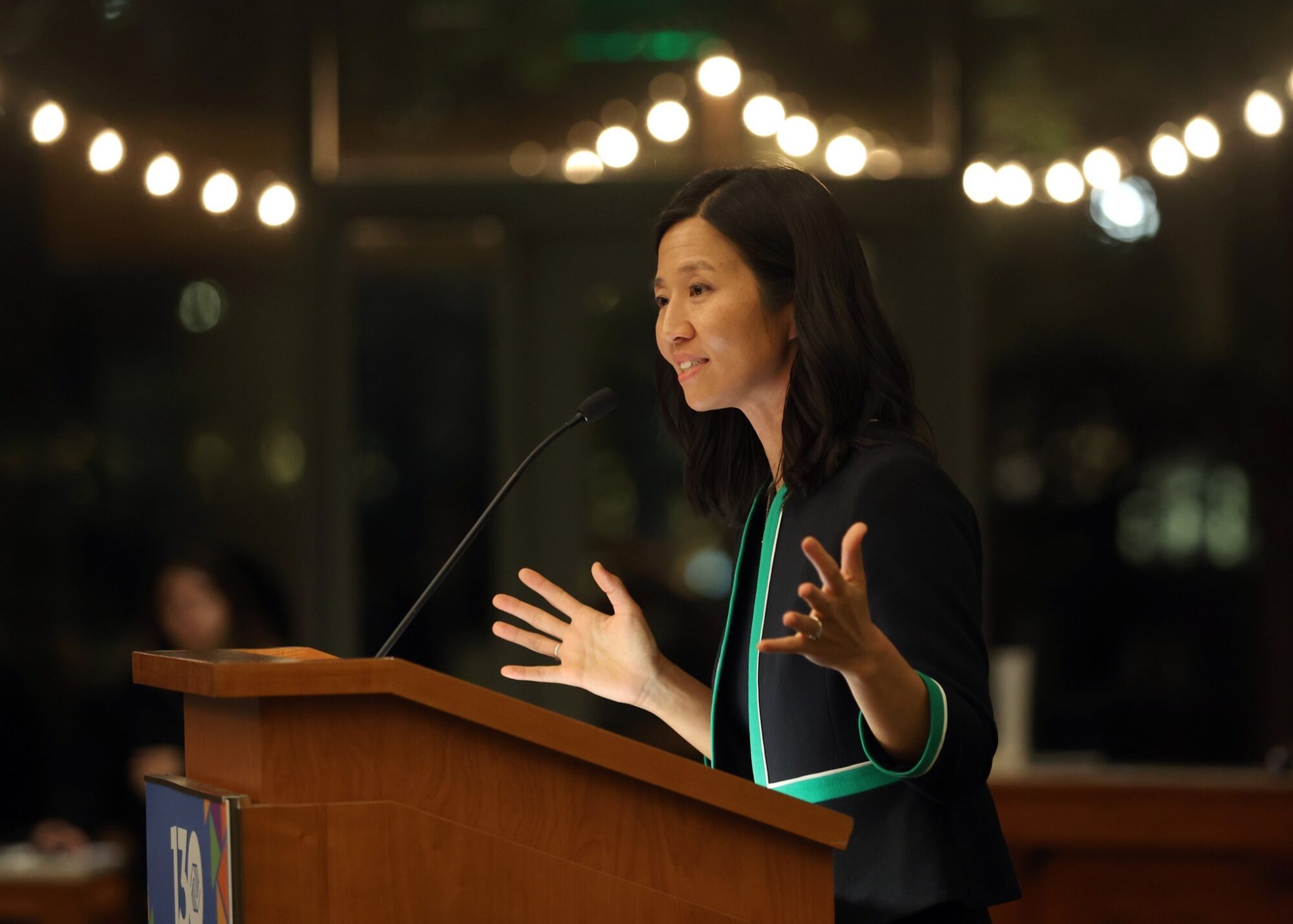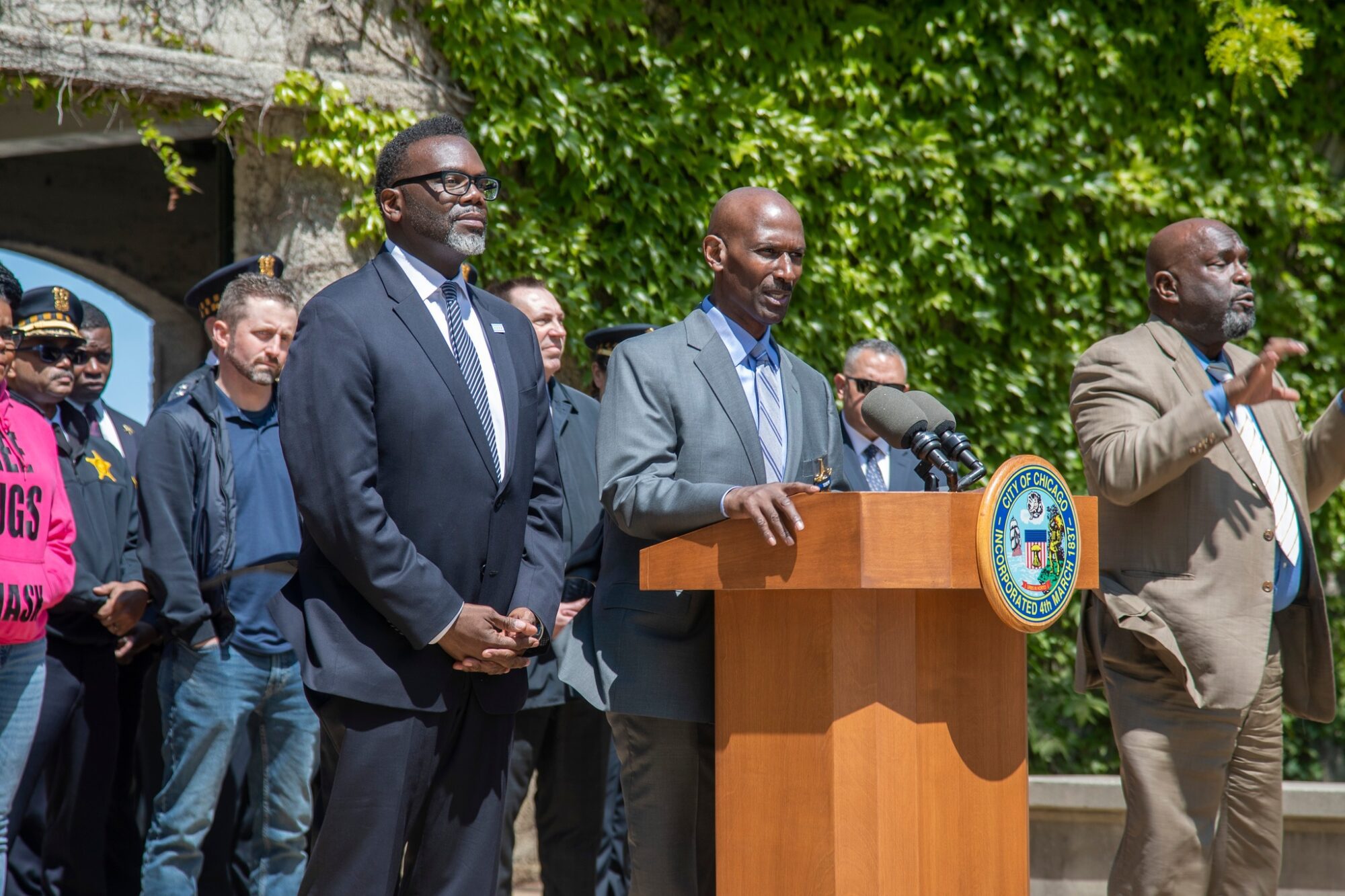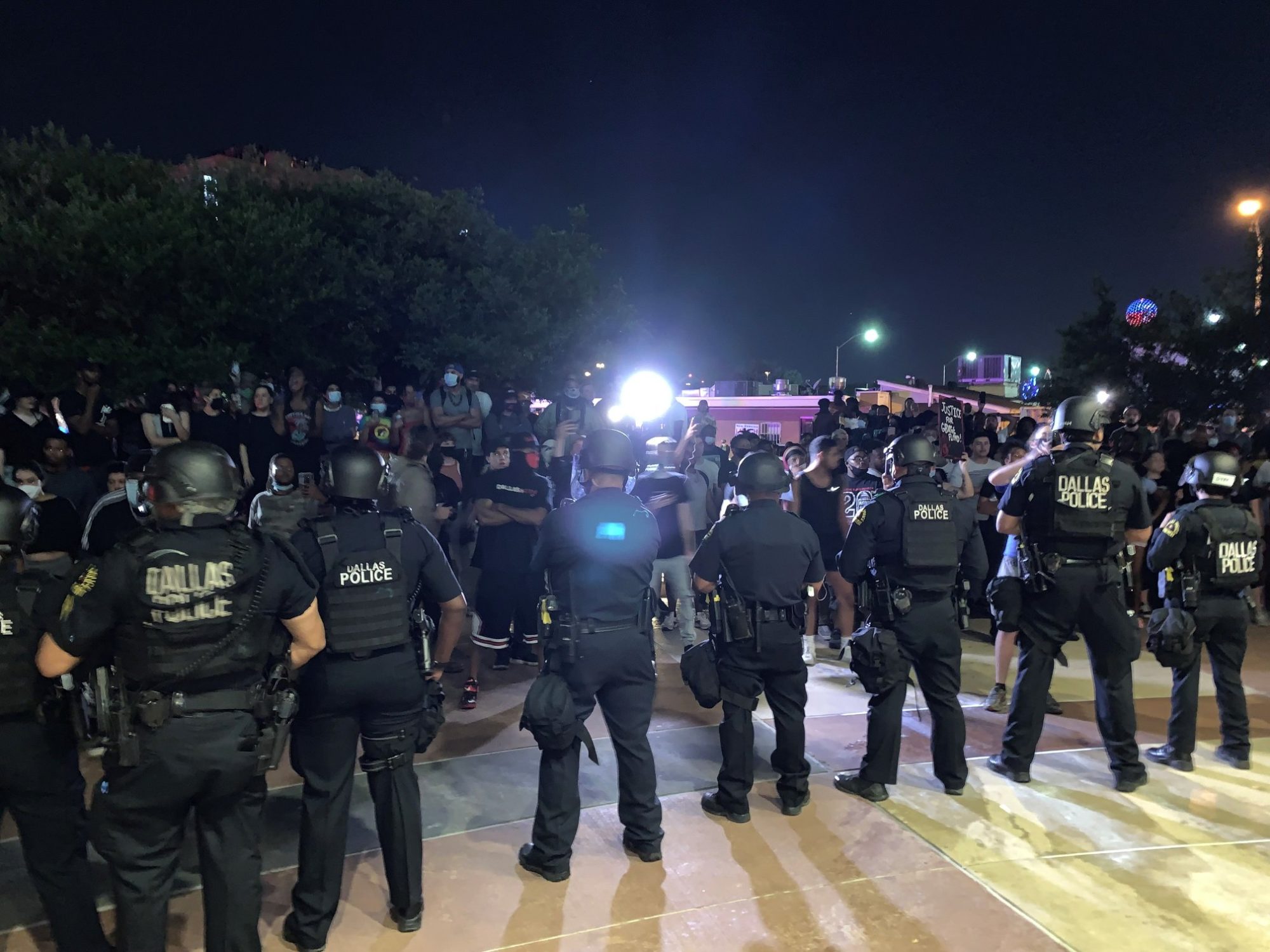Boston Mayor Backtracks on Ending Controversial Police Surveillance Center
Instead, she helped direct an extra $3.4 million in funding to the Boston Regional Intelligence Center, a police surveillance operation that has long been criticized for racial profiling.
| October 13, 2023

During her campaign for Boston Mayor, Michelle Wu’s calls for sweeping reforms to policing included a commitment to abolish the city’s controversial gang database, which a federal appeals court excoriated last year as “flawed” and “built on unsubstantiated inferences.” Wu even went a step further, supporting eliminating the body that runs it: the Boston Regional Intelligence Center (BRIC), a “fusion center” that purports to gather intelligence in order to prevent terrorist attacks in the area. Her stance against BRIC was consistent with her actions as a Boston City Council member; in June 2021, she helped vote down a grant for $850,000 for the center over concerns about transparency and racial bias.
But last month, Wu, now mayor, flipped on that key campaign issue and asked the city to increase funding for BRIC. On Oct. 4, the Boston City Council approved Wu’s funding request, electing in a series of 7-5 votes to give the surveillance center an additional $3.4 million in grant funding to hire eight new analysts—four times the amount that Wu voted against two years ago.
The increase in BRIC funding was approved despite concerns from some city councilors that the center and the Boston Police Department (BPD), which oversees it, had not sufficiently addressed evidence of targeted surveillance, with all five of the council’s members of color voting against the funds. BPD’s gang unit and BRIC’s gang database are currently being investigated for racial bias by the Massachusetts attorney general.
“They provided no metrics, no evidence that it makes us safer,” said Councilor Ricardo Arroyo during the meeting. “The fact that they’re currently under investigation for possible civil rights abuses and racial discrimination makes it impossible for me to vote for those grants today.”
To local organizers, Wu’s 180-degree pivot feels emblematic of a larger reluctance by her administration to enact the policing reforms that she championed during her rise in Boston politics. Wu had called for a 10 percent reduction in the city’s police budget during the Black Lives Matter protests of 2020. The following year, she campaigned for mayor with bold rhetoric around policing as well as specific policy priorities, from ending police use of tear gas and no-knock warrants to abolishing the surveillance center. Anger over years of police abuses helped sweep her into the mayor’s office with a 28-point margin of victory.
But since she took office, those promises largely have not materialized, and funding for law enforcement has mostly gone up. During the most recent round of budget negotiations in June, Wu even rejected the council’s attempt to cut $30 million from the police department, and instead passed a final budget with a $9 million increase for police.
Fatema Ahmad, the executive director of Muslim Justice League, which has led the charge against BRIC funding, said that Wu’s about-face on the surveillance center is part of a broader retreat from the promises that politicians made during the height of the movement for police accountability. “As soon as she was elected, the stances started turning around,” Ahmad told Bolts. “Immediately, we were told that the gang database wasn’t a priority because of other policing issues they were tackling. You know, we saw not only a lack of commitment to decreasing the budget, but now this year an increase in the police budget.”
Wu has gestured to policing reforms instituted since she voted against the BRIC funding in 2021 to explain her change of heart. In a recent letter to city council members urging them to support the increase in funding, Wu wrote, “Since the June 2021 council vote, several consequential policy and leadership changes have been implemented such that the BRIC and the Boston Police Department operate in a significantly different environment today.”
In this new environment, Wu explains, the surveillance BRIC conducts—which she calls “public safety intelligence and analysis”—is crucial to achieving larger public safety goals like reducing gun violence. “From reimagining community outreach and coordination of providers, to engaging high-risk individuals with high-quality supports,” Wu wrote, “Our community safety efforts rely on detailed and accurate intelligence to guide all City agencies to close gaps through deploying coordinated resources and services.” Wu did not respond to Bolts’ request for an interview for this story.
Boston-area activists and other politicians elected in the wake of the 2020 uprising say that little has changed about policing there and argue that Wu’s progressive credentials are now serving to provide cover for what is little more than an attempt to give even more money to a law enforcement agency that operates mostly in the shadows.
janhavi madabushi, the executive director of the Massachusetts Bail Fund, which pays people’s bond so they can stay in their community pre-trial, told Bolts, “I don’t understand how a progressive mayor can rubber stamp and give basically a blank check to the Boston Police Department.”
The Boston Regional Intelligence Center was established in 2005 as one of a host of intelligence-sharing “fusion centers” established around the U.S. after the events of 9/11. BRIC brings together local law enforcement and first responders from nine communities across the Boston metro area, as well as liaisons from the FBI, Department of Homeland Security, and even the “private sector,” according to an archived description of the center on BPD’s website.
“The initial justification for the creation of these places was ‘we need local police to be involved in a nationwide fight against terrorism,’” Kade Crockford, the director of the Massachusetts ACLU’s Technology for Liberty Program and a longtime scholar and critic of the BRIC, told Bolts—despite the fact that the intelligence failures that led to 9/11 had nothing to do with local law enforcement.
“There was almost immediately an identity crisis in these fusion centers, because local police and the democratically elected people that are in charge of the police are in pretty much every city in the country under some degree of pressure politically to deal with regular crime,” Crockford explained. “People are not going to community and neighborhood meetings where they can have coffee with a cop and asking them, ‘What are you doing about al-Qaeda?’” Moreover, actual instances of terrorism on U.S. soil are quite rare; in 2012, a report by the U.S. Senate Subcommittee on Investigations concluded that fusion centers were ineffective and wasteful of taxpayer dollars.
So fusion centers shifted course, allocating resources to ordinary street crime while continuing to maintain their image as crucial bulwarks against terrorism. But Crockford argues that BRIC and its brethren have actually been used for two very different purposes: “One, to monitor people’s noncriminal speech and associations that are protected by the First Amendment related to activism and religious expression; and two, to continue criminal intelligence operations primarily directed at Black and Latino young people under the auspices of anti-gang programs.”
BRIC regularly shared information about Boston public school students with ICE, with life-changing consequences for at least one person: in 2018, a young Salvadoran man was deported after police wrongly labeled him as an MS-13 associate. A 2012 report by the Massachusetts ACLU and state chapter of the National Lawyers Guild found that the center has a habit of spying on anti-war demonstrators and other activists engaged in constitutionally protected forms of protest. And in late 2017, FOIA requests by the organization revealed that BRIC had used a social media surveillance program called Geofeedia to monitor common Arabic terms like ummah, which translates to “community,” as well as phrases like #blacklivesmatter and #muslimlivesmatter. The program flagged posts that expressed solidarity between Jews and Muslims, tweets from the volunteer group Muslims Against Hunger, and a slew of sophomoric jokes about ISIS. (“My god ISIS needs some decent videographers. Any Emerson students interested? I hear they pay well in promised virgins.”)
“We’re so used to being surveilled by every type of law enforcement,” said Ahmad of the Muslim Justice League, speaking about Muslim communities in the U.S. “And so when you have something like BRIC locally, it’s just so much harder for the community here to feel like they can talk about their politics especially, or organize in the face of an institution that’s not just flagging them for using just really common Muslim words—but also clearly going after activists.”
Today, BRIC operates a fleet of cameras throughout the Boston metropolitan area—including at least 40 in the northwest suburb of Somerville, which, like all the other cities besides Boston included within its purview, has no direct say over how or where that surveillance technology gets used. Willie Burnley Jr., a city councilor in Somerville, says this presents basic democratic and transparency issues. “Without the consent of the council and an explicit pathway for us to withdraw participation in BRIC, it puts us in a particularly challenging position to adequately protect our constituents from surveillance that may not be in their best interest,” he told Bolts.
Moreover, Burnley says that BRIC’s inter-agency status allows it to effectively override the fact that Somerville, as a smaller, more progressive city than Boston, has different attitudes towards policing and greater checks already in place around the use of surveillance technology. Burnley himself was elected to his at-large city council seat in Somerville in 2021, after helping found the activist group Somerville Defund the Police, which advocated for the reallocation of money away from the Somerville Police Department and towards social services and housing.
Recently, when the department decided it wanted access to a phone hacking program, GRAYKEY, BRIC went ahead and bought it for them. “This extremely well-funded multi-jurisdictional surveillance structure is bypassing our own municipal laws and policies,” Burnley told Bolts. The department still needs to go before the council to be granted official use of the technology, Burnley said, but the center’s actions seemed to bypass some standard checks and balances on police department authority. “We’re not in the police department watching them every day,” he said. “So the fact that they have this technology, we have to essentially take them at their word that they aren’t using it.”
BRIC has been arguably best known for the controversial gang database it maintains: a list of thousands of Boston-area residents, only about 2 percent of whom are white. As of 2021, 75 percent of names in the database belong to Black people, who make up only 7 percent of the Boston metro population.
Wu once spoke of abolishing the gang database altogether. But earlier this month, in her letter to city council asking for increased BRIC funding, she praised new guidelines for the database that resulted in the removal of nearly 2,500 names since 2021.
But to local activists, this purge doesn’t go far enough. They believe that the entire methodology that underpins the database is fundamentally flawed.
“There’s this myth that they’re using some kind of science for figuring out who is a gang member in this database, but it’s based on this 10-point model,” said Ahmad. “It’s all very behavioral. And that hasn’t changed.” Residents are assigned different numbers of points for various behaviors or associations, including the clothing or tattoos they sport and the people they interact with. The young Salvadoran man who was deported had racked up 21 points, all for instances in which police observed him hanging out with people they had also labeled MS-13 associates or gang members.
madabushi’s organization posts bond for residents in five counties, including Suffolk, where Boston is located. They said that the people they work with are more likely to be assigned a higher bail, denied bail entirely, or face harsher conditions of release, such as house arrest or GPS monitoring when their name appears in the gang database. “Young people are being surveilled over social media and if there is cash appearing in a young person’s picture, or a certain kind of hat that they are wearing, the BRIC is making assumptions about what that could mean for them being involved in organized crime,” they told Bolts. They have also seen people in this situation receive additional federal charges or have immigration enforcement looped in.
madabushi also noted that from the experience of the community members the bail fund works with, the collateral consequences of inclusion on the gang database don’t necessarily end when someone’s name is removed. “The demand is not to purge names from the database, the demand is to completely shut down the database and shut down the entity that is carrying on this kind of racist surveillance,” they said.
While Wu has pointed to changes in the gang database to justify backtracking on the BRIC grants, she has also gestured to broader police oversight and accountability reforms that have been implemented since 2020.
In both her letter to council and a recent interview with WBUR, the mayor cited the creation of new state and local police oversight bodies—the Massachusetts Peace Officer Standards and Training Commission, as well as its local counterpart, Boston’s Office of Police Accountability and Transparency.
The state commission, established by a 2020 police reform law, is supposed to standardize training, certification and disciplinary standards for police, as well as maintain a public database of police disciplinary records, but its work has been beset by delays and debate over how much information about officers should be posted online. Some worry the commission is essentially toothless since it can’t compel agencies to disclose records or mandate that they remain public. And since it’s only tasked with oversight of sworn law enforcement officers, it’s unclear how the new state police commission could provide more accountability for the many civilian analysts who work at BRIC and feed information to local law enforcement.
As for Boston’s Office of Police Accountability and Transparency, which was created in January 2021 to review police policy and investigate civilian complaints against officers, it has faced staff turnover and criticism that it has done very little. Of the 107 complaints submitted since its inception, only three were sustained (47 were still pending as of publication, according to the database). Of these, two involved officers posting inappropriate information or comments online—information that is more or less objectively verifiable.
Ahmad with the Muslim Justice League questioned whether the new office would have any impact on BRIC operations. How could people surveilled or targeted by BRIC even know enough about the center’s actions to submit a successful complaint?
To her, recent reforms like the state police commission and Boston’s police accountability office largely seem like window dressing to make a weary public feel better about law enforcement. “These task forces and commissions and, you know, call them whatever name you give them—it doesn’t address the root problems,” she said.
Stay up-to-date
Support us
Bolts is a non-profit newsroom that relies on donations, and it takes resources to produce this work. If you appreciate our value, become a monthly donor or make a contribution.




